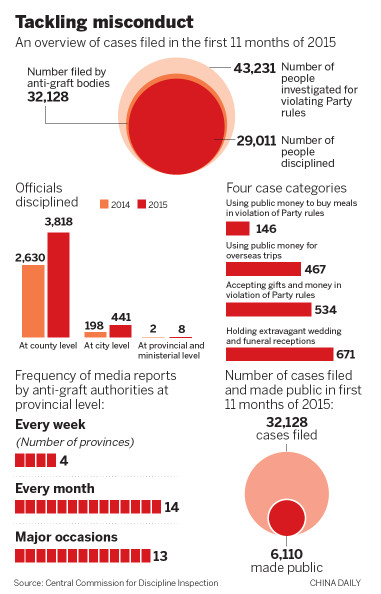Top watchdog vows to take tougher line against officials violating regulations
More than 29,000 people were subject to Party discipline and government regulations during the first 11 months of last year as the country's anti-graft campaign picked up steam.
A total of 29,011 were involved in more than 32,000 cases that contravened the eight-point regulations aimed at practicing austerity among Party members and bringing the Party closer to the masses.
The figures were announced on the website of the Central Commission for Discipline Inspection, the county's top anti-corruption body.
In 2014, a total of 23,646 people were reprimanded in 53,085 cases.
In contrast, the number of senior Party officials found to have committed misconduct in 2015 increased.
Eight officials at provincial or ministerial level, 441 city-level and 3,818 county-level officials were punished in the first 11 months of last year. The figures for officials at the three levels for the whole of 2014 were two, 198 and 2,630, respectively.
The number of officials at and above county level punished from January to November last year rose by 51 percent year-on-year.
The commission pledged to take a tougher line against officials who violate the eight-point regulations and to make "ceaseless efforts" to root out bureaucracy, extravagance and undesirable work practices.
Nationwide in the first 11 months of last year, 1,818 cases involved the use of public money for meals and overseas trips, accepting gifts and money in contravention of Party rules, and holding extravagant wedding and funeral receptions.
The anti-graft body warned that such violations could go "underground", and listed examples of misbehavior.
Some officials ate in canteens at their workplaces without paying and some asked companies to foot the bill for their meals, the commission said.
It added that some officials used public money for tourism after saying they were holding meetings and developing research projects. Others accepted gift cards through middlemen.
Sixty-four officials from State-owned enterprises administered by central authorities had been investigated by the end of November, the commission said on Monday. They are largely from firms in the energy, communication, transportation and machine manufacturing sectors.



















































